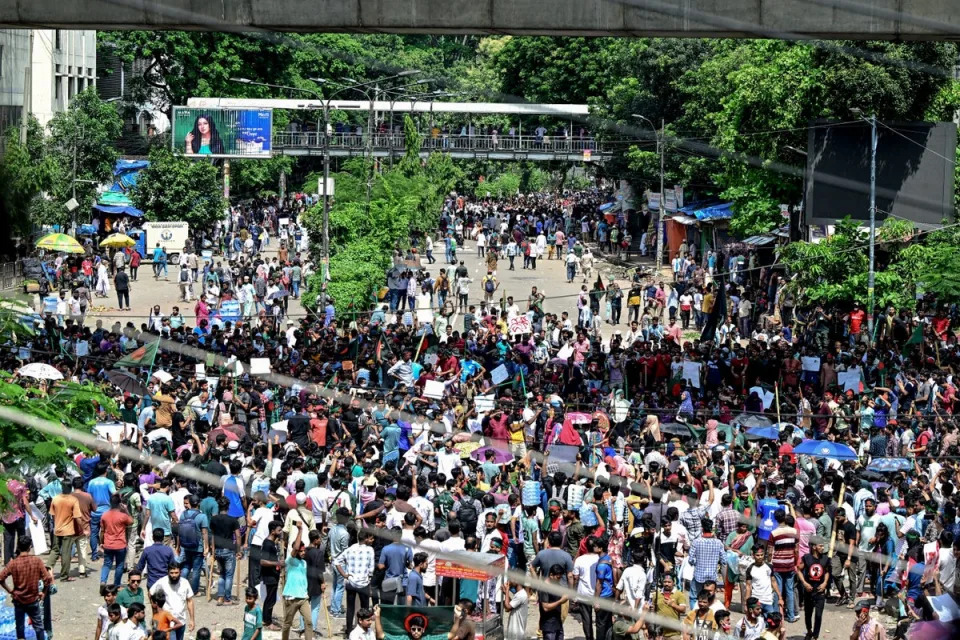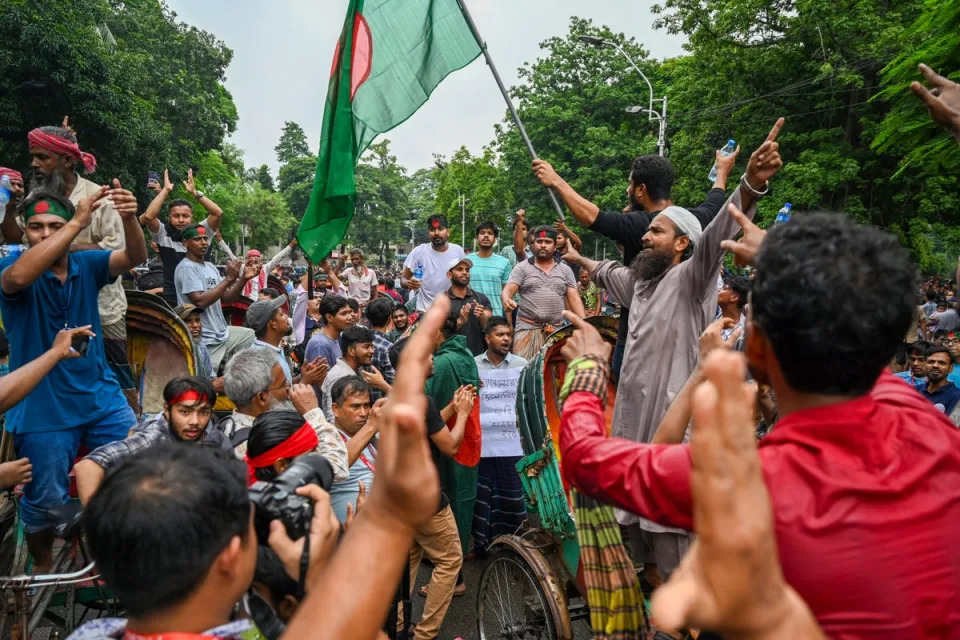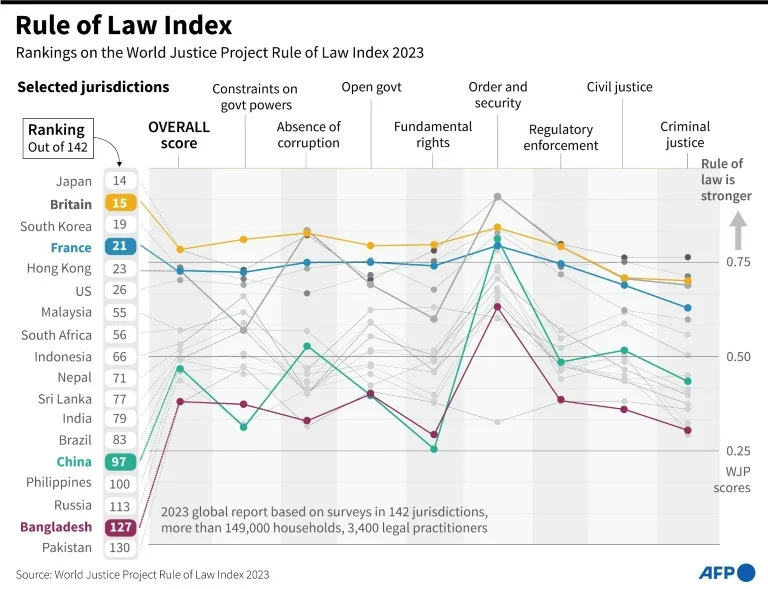At least 91 killed as clashes rock Bangladesh, curfew imposed
PROPERTY DAMAGE IS NOT 'VIOLENCE'
Updated Sun, 4 August 2024
By Ruma Paul
DHAKA (Reuters) -At least 91 people were killed and hundreds injured in clashes in Bangladesh on Sunday as police fired tear gas and rubber bullets to disperse tens of thousands of protesters calling for Prime Minister Sheikh Hasina to resign.
The death toll, which includes at least 13 policemen, was the highest for a single day from any protests in Bangladesh's recent history, surpassing the 67 deaths reported on July 19 when students took to the streets to demand the scrapping of quotas for government jobs.
The government declared an indefinite nationwide curfew starting at 6 p.m. (1200 GMT) on Sunday, the first time it has taken such a step during the current protests that began last month. It also announced a three-day general holiday starting from Monday.
The unrest, which has prompted the government to shut down internet services, is Hasina's biggest test in her 20-year regime after she won a fourth straight term in elections that were boycotted by the main opposition Bangladesh Nationalist Party.
Critics of Hasina, along with human rights groups, have accused her government of using excessive force against protesters, a charge she and her ministers deny.
Demonstrators blocked major highways on Sunday as student protesters launched a non-cooperation program to press for the government's resignation, and violence spread nationwide.
"Those who are carrying out violence are not students but terrorists who are out to destabilize the nation," Hasina said after a national security panel meeting, attended by the chiefs of the army, navy, air force, police and other agencies.
"I appeal to our countrymen to suppress these terrorists with a strong hand."
Police stations and ruling party offices were targeted as violence rocked the country of 170 million people.
Thirteen policemen were beaten to death in the north-western district of Sirajganj, police said. Nine others were killed in the district, where two lawmakers' homes were set on fire.
At least 11 people, including two students and a ruling party leader, were killed and dozens injured amid fierce clashes in several places in the capital, Dhaka, police and witnesses said.
India's foreign ministry urged its nationals not to travel to Bangladesh until further notice.
BULLET WOUNDS
Two construction workers were killed on their way to work and 30 injured in the central district of Munsiganj, during a three-way clash of protesters, police and ruling party activists, witnesses said.
"They were brought dead to the hospital with bullet wounds," said Abu Hena Mohammad Jamal, the superintendent of the district hospital.
Police said they had not fired any live bullets.
In the northeastern district of Pabna, at least three people were killed and 50 injured during a clash between protesters and activists of Hasina's ruling Awami League party, witnesses said.
Eight each in Feni and Lakshmipur, six in Narsingdi, five in Rangpur, four in Magura and the rest in several other districts, hospital officials said.
"An attack on a hospital is unacceptable," said Health Minister Samanta Lal Sen after a group vandalised a medical college hospital and set fire to vehicles, including an ambulance, in Dhaka.
At least four garment factories were set on fire in Ashulia, on the outskirts of Dhaka, police said.
For the second time during the recent protests, the government shut down high-speed internet services, mobile operators said. Social media platforms Facebook and WhatsApp were not available, even via broadband connections.
Bangladesh authorities instructed the country’s telecoms providers on Sunday to shut down 4G, effectively disabling internet services, according to a confidential government memo seen by Reuters.
GOVERNMENT ORDERS
“You are requested to shut down all your 4G services until further notice, only 2G will be effective,” said the document issued by the National Telecommunication Monitoring Center, a government intelligence agency.
Telecoms companies were previously told their licences would be cancelled if they did not comply with government orders, a person with direct knowledge told Reuters.
The telecom regulatory body did not respond to Reuters' calls.
Last month, at least 150 people were killed and thousands injured in violence touched off by student groups protesting against quotas for government jobs.
The protests paused after the Supreme Court scrapped most quotas, but students returned to the streets in sporadic protests last week, demanding justice for the families of those killed.
"I think the genie is out of the bottle and Hasina may not put it back in the bottle again," said Shakil Ahmed, associate professor for government and politics at Jahangirnagar University.
Chief of Army Staff General Waker-Uz-Zaman on Saturday directed his officers to ensure the security of people's lives, properties, and important state installations under all circumstances, a statement said.
"(The) Bangladesh Army is a symbol of the people's trust. The army is always there and will always be there for the people's interests and for any needs of the state," the statement quoted him as saying.
Zaman will brief the media on Monday, an army spokesman said.
(Reporting by Ruma Paul; Additional reporting by Fanny Potkin; Editing by Christina Fincher and David Holmes)
At least 27 people killed in fresh violence in Bangladesh as protesters demand PM Hasina’s resignation
Alisha Rahaman Sarkar
Sun, 4 August 2024
At least 27 people have been killed in Bangladesh over the weekend as anti-government protesters clashed with the police during fresh demonstrations.
Hundreds of thousands of protesters returned to the streets of the South Asian nation demanding the resignation of prime minister Sheikh Hasina after 200 people were killed earlier this month during anti-quota demonstrations that turned violent.
The government in July shut schools and universities across the country, blocked internet access, restricted social media platforms and imposed a shoot-on-sight curfew. The protests subdued for a few days after the Supreme Court scaled back the quota of government jobs reserved for families of the 1971 war heroes.

Buses are seen on fire at the Bangabandhu Sheikh Mujib Medical University premises (Getty)
Since then at least 11,000 people have been arrested in recent weeks.
The protesters this week called for “non-cooperation”, urging people not to pay taxes and utility bills and not show up for work on Sunday, a working day in Bangladesh. Offices, banks and factories opened, but commuters in Dhaka and other cities faced challenges getting to work.
The Bangabandhu Sheikh Mujib Medical University, a major public hospital in Dhaka’s Shahbagh area, was set on fire along with an ambulance and several vehicles.

Protesters wave national flags as they stand over the Anti Terrorism Raju Memorial Sculpture in capital Dhaka, Bangladesh (Getty)
The police have used tear gas and rubber bullets to disperse the protesters across the country, leaving dozens of people injured in hospitals.
“An attack on a hospital is unacceptable,” said health minister Samanta Lal Senm adding that everyone “should refrain from this”.
Mobile internet services have been shut down in the country but broadband services remained active, according to reports.
The interior ministry declared an indefinite nationwide curfew starting at 6pm on Sunday, the first time it has taken such a step during the current protests that began last month.

Thousands pour onto the streets of Bangladesh in protest (Getty)
Critics of Ms Hasina, along with human rights groups, have accused her government of using excessive force to throttle dissent during the first phase of the anti-quota movement. She has denied the allegations.
Ms Hasina doubled down on her claims that her political opponents, the Bangladesh Nationalist Party were behind the protests that were the sternest challenge to her 15 years in power.
Two construction workers were killed on their way to work and 30 injured in the central district of Munsiganj, during a three-way clash of protesters, police and ruling party activists, witnesses said.
“They were brought dead to the hospital with bullet wounds,” said Abu Hena Mohammad Jamal, the superintendent of the district hospital, told Reuters.

Anti-discrimination student movement holds a rally at Central Shaheed Minar in Dhaka (Getty)
However, police have denied firing bullets at the protesters.
In the northeastern district of Pabna, at least three people were killed and 50 injured during a clash between protesters and activists of Ms Hasina’s ruling Awami League.
Two more were killed in violence in the northern district of Bogura, and 20 were killed in nine other districts, hospital officials said.
“Those who are protesting on the streets right now are not students, but terrorists who are out to destabilise the nation,” Ms Hasina said after a national security panel meeting. “I appeal to our countrymen to suppress these terrorists with a strong hand.”
The protests began last month as students demanded an end to a quota system that reserved 30 per cent of government jobs for the families of veterans who fought in Bangladesh’s war of independence against Pakistan in 1971.
As violence crested, the country’s Supreme Court scaled back the quota system to 5 per cent of jobs, with 3 per cent for relatives of veterans.
Bangladesh protesters demand PM resign as death toll mounts
Shafiqul ALAM
Sun, 4 August 2024

Chart showing selected jurisdictions on the World Justice Project Rule of Law Index 2023
Hundreds of thousands of Bangladeshi protesters demanding Prime Minister Sheikh Hasina resign clashed with government supporters Sunday, with scores killed in one of the deadliest days since demonstrations began.
Rallies that began last month against civil service job quotas have escalated into some of the worst unrest of Hasina's 15-year rule and shifted into wider calls for the 76-year-old to step down.
At least 77 people were killed on Sunday alone, including 14 police officers, with the rival sides battling with sticks and knives and security forces firing rifles, taking the total killed since protests began in July to at least 283.
Local media reports citing law enforcement officials suggested Sunday's toll may have surpassed 90 deaths.
Police said protesters attacked their officers, including storming a station in the northeastern town of Enayetpur.
"The terrorists attacked the police station and killed 11 policemen," said Bijoy Basak, a deputy inspector general.
AFP journalists in Dhaka reported hearing sustained crackles of gunfire after dark on Sunday, with protesters defying a nationwide curfew.
At least 12 people were killed in the capital, police and doctors at hospitals said, with several of the victims suffering bullet wounds, while 18 died in Bangladesh's northern district of Sirajganj.
Mobile internet was tightly restricted countrywide.
"The shocking violence in Bangladesh must stop," United Nations rights chief Volker Turk said in a statement, emphasizing his concerns about further deaths ahead of a mass march on Dhaka planned for Monday.
- 'Final protest' -
In several cases, soldiers and police did not intervene to stem the protests, unlike the past month of rallies that repeatedly ended in deadly crackdowns.
In a hugely symbolic rebuke of Hasina, a respected former army chief demanded the government withdraw troops and allow protests.
Demonstrators in Dhaka, surrounded by a tightly packed and cheering crowd, waved a Bangladeshi flag on top of an armoured car as soldiers watched, according to videos on social media verified by AFP.
Asif Mahmud, one of the key leaders in the nationwide civil disobedience campaign, called on supporters to march on the capital Monday.
"The time has come for the final protest", he said.
Troops briefly imposed order after violence erupted in July, but protesters returned to the streets in huge numbers this month in a non-cooperation movement aimed at paralysing the government.
- 'Brought to justice' -
Vast crowds of protesters, many wielding sticks, packed into Dhaka's central Shahbagh Square on Sunday, with street battles in multiple sites, police said.
"There were clashes between students and the ruling party men," police inspector Al Helal told AFP, saying two young men were killed in Dhaka's Munshiganj district.
"One of the dead was hacked in his head and another had gunshot injuries."
Another policeman, who asked not to be identified, said the city had "turned into a battleground".
Police and doctors also reported deaths in districts in the north, west, south and centre of the country.
On Sunday, India's foreign ministry said it "strongly advised" its nationals not to travel to neighboring Bangladesh until further notice.
Some former military officers have joined the student movement and ex-army chief General Ikbal Karim Bhuiyan turned his Facebook profile picture red in a show of support.
"We call on the incumbent government to withdraw the armed forces from the street immediately," Bhuiyan told reporters Sunday in a joint statement alongside other senior ex-officers, condemning "egregious killings, torture, disappearances and mass arrests".
"Those who are responsible for pushing people of this country to a state of such an extreme misery will have to be brought to justice", he said.
- 'No longer about job quotas' -
Current army chief Waker-uz-Zaman told officers at military headquarters in Dhaka on Saturday the "Bangladesh Army is the symbol of trust of the people".
"It always stood by the people and will do so for the sake of people and in any need of the state," he said, according to an army statement, which gave no further details and did not say explicitly whether the army backed the protests.
The demonstrations have grown into a wider anti-government movement across the South Asian nation of about 170 million people.
It has attracted people from all strata of Bangladesh society, including film stars, musicians and singers. Rap songs calling for people's support have spread widely on social media.
A group of 47 manufacturers in the economically vital garment sector said Sunday they stood in "solidarity" with the protesters.
Hasina has ruled Bangladesh since 2009 and won her fourth consecutive election in January after a vote without genuine opposi
Her government is accused by rights groups of misusing state institutions to entrench its hold on power and stamp out dissent, including through the extrajudicial killing of opposition activists.
Demonstrations began over the reintroduction of the quota scheme, which reserved more than half of all government jobs for certain groups. It has since been scaled back by Bangladesh's top court.
sa/pjm/bjt/mlm
No comments:
Post a Comment